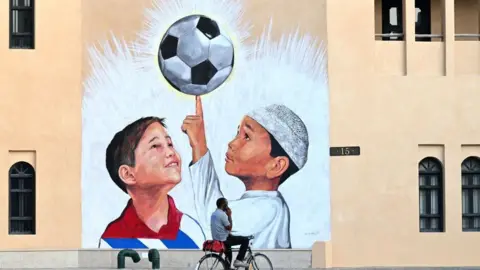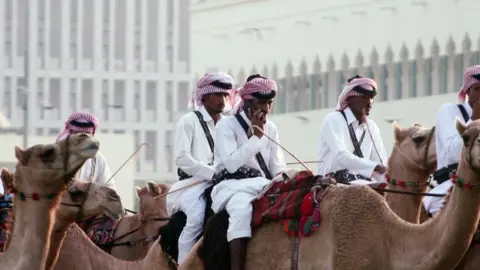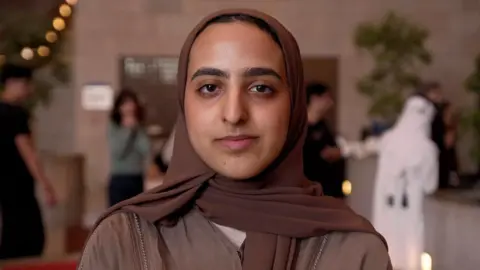World Cup 2022: 'I don't want to worry about being killed'
 Getty Images
Getty ImagesThe focus is on human rights in Qatar as it prepares to host football's World Cup, starting on Sunday. Two people tell us how the country's strict religious laws and customs have affected their lives.
Aziz moves around nervously as we chat online. He wanted to speak out, but it is clear this is taking a huge amount of courage, and he remains solemn throughout our conversation.
"I would like my existence not to be illegal in my country," he says, in a low voice from Qatar's capital Doha. "I would like reforms that would say I can be gay and not worry about being killed."
Aziz says his day-to-day anxiety comes from having to constantly watch what he says in case the wrong word to the wrong person leads to arrest or an attack for being gay.
"The difference between being in Qatar and outside Qatar, is that outside, the law is on your side," he says.
"If somebody attacks you, you would go to the police station and be protected. Whereas here, if something happens to me, I may even put myself more in danger by going to the police."
In its report last month, non-governmental organisation Human Rights Watch said LGBT people in Qatar have been subject to arbitrary detention by the security forces and to verbal and physical harassment.
The World Cup has of course meant gay rights in Qatar have been under scrutiny in the Western media.

While that sheds light on the issues, Aziz says it is also making people more vulnerable.
"I now see a lot of people here speaking against LGBT people online and saying we are disgusting and against religion," he says.
He feels the discussion has been badly framed in the outside world too.
"They are asking 'Is it safe for us to come to Qatar and be ourselves without having to go to jail or being subjected to Qatari law?' but they are not really thinking about people like us, and how dangerous those laws can be for us."
Qatari authorities are keen to stress all football fans will be welcomed during the tournament, but also that visitors should show cultural sensitivity.
Aziz fears a successful World Cup, and the portrayal of a fun-loving nation, will mean Qatar is even less likely to change. He worries about a backlash in the coming months.

In the UK, we meet Zainab, which is not her real name. Even though she is here, she worries that being identifiable could mean repercussions for family back in Qatar.
She says elements of the religious conservatism in Qatari law impacted her mental health and the so-called male guardianship system over women "is like being a minor for your entire life".
"For every single major life decision, you require the explicit written permission from a male guardian, usually your father, but if he is not alive then your uncle, brother or grandfather.
"If you don't get that permission, you cannot take that decision, whether it is enrolling at university and studying abroad, travelling, getting married, getting divorced."
Zainab said having a conservative father meant she would not have been able to live the life she wanted. She did not want us to document her experience in detail in case it identified her and led to difficulties for her family.
She said some Qatari women, whose liberal families did not stand in their way, would deny the system was harmful.
 Getty Images
Getty ImagesZainab said the system means women can suffer at the hands of controlling family members and Qatar's strict laws keep the tribal conservatives happy.
"They believe that the idea of women's rights is somehow a Western idea, and something that will clash with Islamic values, with their culture and traditions," she says.

Qatari World Cup officials have said criticism of their country is ill-informed.
That view is reinforced by one student, Moselle, at Doha's Education City: "We don't need Western organisations coming here and telling us what we should and shouldn't do," she says.
"It's our own country. We have to get the chance to develop in the way we see suitable, not in the way that is dictated upon us."
But criticism of Qatari society by its own citizens is heavily censored. As we have seen, those who speak out are often frightened of the consequences.
Those we have spoken to are not complaining about the smaller cultural differences that are cited, like being able to drink or kiss in public, they are talking about issues they believe are basic human rights.
Additional reporting by Harry Farley.
